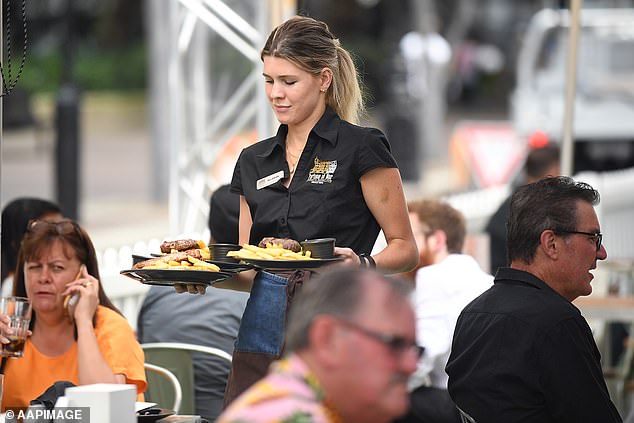Big blow for Albo: Australian economy grows at slowest pace in more than three decades

- Economy grew by only 1 percent
The Australian economy is now growing at its slowest pace since the early 1990s recession, barring a pandemic.
Gross domestic product grew by just 1 percent in the year to June, well below the long-term average of 3 percent.
The cost of living crisis is forcing consumers to curb their spending, as they did during the COVID lockdowns.
Outside of the 2020 pandemic, this was the slowest annual pace of economic growth since the 1991 recession, the last economic downturn caused by aggressive rate hikes.
The bad news came just days after Finance Minister Jim Chalmers accused the Reserve Bank of the rate hikes “destroying the economy”.
Australia is not yet in a technical recession (two consecutive quarters of economic contraction).
But since early 2023, the country has been struggling with a per capita recession, with output per Australian shrinking by 1.5 percent in the last budget year.
While productivity grew by a weak 0.5 percent over the year, it fell by 0.8 percent over three months in the June quarter.

The Australian economy is now growing at its slowest pace since the recession of the early 1990s
The cost of living crisis is truly bad, with household spending down 0.2 per cent, the worst decline since mid-2021, when the Delta outbreak led to lockdowns in Sydney and Melbourne.
Australia is also facing a record number of corporate bankruptcies, following the Reserve Bank’s 13 rate hikes in 2022 and 2023.
Prime Minister Anthony Albanese’s Labor government faces a vote in May next year, while Reserve Bank Governor Michele Bullock last month ruled out cutting interest rates before Christmas.
Dr Chalmers braced himself for the bad news earlier this week by blaming the RBA for Australia’s sluggish economy.
“Given all this global uncertainty, on top of the impact of interest rate hikes that are wreaking havoc on the economy, it would not be a surprise if the national accounts showed weak and muted growth on Wednesday,” he said.
Variable mortgage terms have risen 68 per cent since May 2022, with the RBA cash rate standing at 4.35 per cent, a 12-year high.
Julia Gillard lost her Labor majority in 2010 as a result of the global financial crisis, even though annual economic growth was at a much more respectable 3.3 percent thanks to large-scale stimulus programs.

Prime Minister Anthony Albanese’s Labor government is expected to go to the polls in May next year, while Reserve Bank Governor Michele Bullock last month ruled out rate cuts before Christmas.
Even in better economic times, she was forced to form a minority government with the Greens and independents, while opinion polls indicate a similar fate awaits Albania’s government in 2025.
The weakness of economic activity has made it difficult for Labour governments to be re-elected. Paul Keating only won the 1993 election because his Liberal opponent John Hewson had proposed a hated 15 per cent GST.
While the annual growth rate of 1 percent was the worst since 1991, it was slightly better than the Reserve Bank’s forecast of 0.9 percent in its August monetary policy statement.
Financial markets had also expected a 0.9 percent increase.
In the second quarter, the economy grew by only 0.2 percent.




